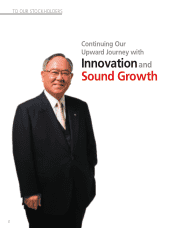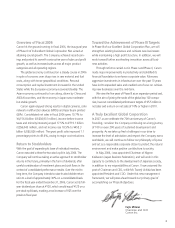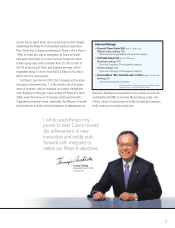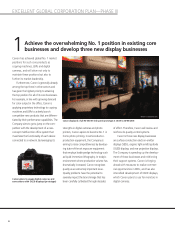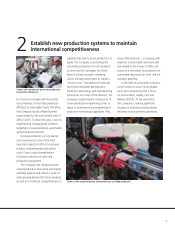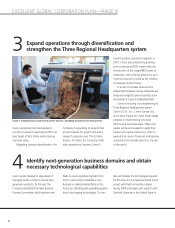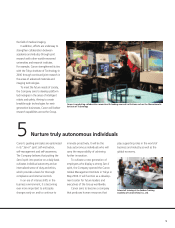Canon 2006 Annual Report Download - page 14
Download and view the complete annual report
Please find page 14 of the 2006 Canon annual report below. You can navigate through the pages in the report by either clicking on the pages listed below, or by using the keyword search tool below to find specific information within the annual report.
12
Coordination Committee, which analyzes trends in legal develop-
ments and works to raise the level of employee awareness
regarding important legal issues facing the Group; and the
Disclosure Committee, which is dedicated to ensuring the
dissemination of accurate and thorough information.
Compliance
Since its founding, employee education has been based on the
guiding principles of the San-Ji, or “Three Selfs” spirit, namely
“self-motivation,” or taking the initiative and being proactive in
all things; “self-management,” or conducting oneself responsibly
and being accountable for all one’s actions; and “self-aware-
ness,” or understanding one’s situation and role in it. Based upon
these principles, the Canon Group Code of Conduct was estab-
lished as a standard for executives and employees.
Canon holds a Compliance Week twice per year to give
employees a chance to discuss issues related to compliance and
corporate ethics that may arise in actual operations, and to recog-
nize the importance of their individual actions in the workplace.
Disclosure
Canon makes every effort to disclose information on its manage-
ment and business strategies as well as its performance results to
stockholders, investors and all other stakeholders in an accurate,
fair and timely manner. To this end, Canon holds regular briefings
and posts the latest information on its Website together with a
broad range of disclosure materials. Canon has established its
own Disclosure Guidelines, in addition to a Disclosure Committee
that serves to ensure strict compliance with disclosure regulations
prescribed by stock exchanges.
With 46.9% of Canon’s shares owned by non-Japanese
investors as of December 31, 2006, the Group goes to great
lengths to promote close relations with non-Japanese institutional
investors, maintaining IR bases in Europe and the United States
and working to ensure that investors inside and outside of Japan
have access to the same information. Recognizing the growing
influence of individual investors in capital markets, Canon has also
initiated IR briefings at which the Chairman and CEO or a Group
executive from the Finance & Accounting Headquarters presents
the Group’s strategies and answers questions that arise. Canon
will continue to promote transparency and understanding of its
activities by practicing thoroughgoing disclosure.
Significant Differences in Corporate Governance Practices
between Canon and U.S. Companies Listed on the NYSE
Section 303A of the New York Stock Exchange (the “NYSE”)
Listed Company Manual (the “Manual”) provides that companies
listed on the NYSE must comply with certain corporate gover-
nance standards. However, foreign private issuers whose shares
have been listed on the NYSE, such as Canon Inc. (the
“Company”), are permitted, with certain exceptions, to follow
the laws and practice of their home country in place of the
corporate governance practices stipulated under the Manual. In
such circumstances, the foreign private issuer is required to
disclose the significant differences between the corporate gover-
nance practices under Section 303A of the Manual and those
required in Japan. A summary of these differences as they apply
to the Company is provided below.
1. Directors
Currently, the Company’s board of directors does not have any
director who could be regarded as an “independent director”
under the NYSE Corporate Governance Rules for U.S. listed
companies. Unlike the NYSE Corporate Governance Rules, the
Corporation Law of Japan (the “Corporation Law”) does not
require Japanese companies with a board of corporate auditors
such as the Company, to appoint independent directors as
members of the board of directors. The NYSE Corporate
Governance Rules require non-management directors of U.S.
listed companies to meet at regularly scheduled executive ses-
sions without the presence of management. Unlike the NYSE
Corporate Governance Rules, however, the Corporation Law
does not require companies to implement an internal corporate
organ or committee comprised solely of independent directors.
Thus, the Company’s board of directors currently does not
include any non-management directors.
2. Committees
Under the Corporation Law, the Company may choose to:
(i) have an audit committee, nomination committee and compen-
sation committee and abolish the post of corporate auditors; or
(ii) have a board of corporate auditors.
CORPORATE GOVERNANCE


